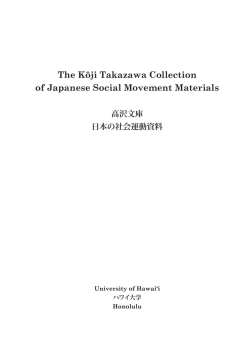
DP Year 1 Japanese SL
DP Year 1 Japanese SL Yoshiko Tsukamoto #409B [email protected] (808) 261-0707 x 2240 The IB Japanese course is a two year program where the students will be given opportunities to apply the knowledge that they have acquired to address contemporary global issues in Japanese. They will engage one another in debating issues which will help them to develop their critical thinking skills. They will read passages relating to the topics listed below and practice writing essays using the appropriate structures and rhetorical devices, while building up their knowledge of Chinese characters. The core topics covered during this program are in the following three areas: Social relationships, Communication and Media, and Global issues. The course will focus on two additional topics: Leisure and Customs, and Traditions. Students will develop their communication skills more effectively by using the three interrelated components of communication: language, cultural interaction, and message. Throughout the course, the students will continue to expand their vocabulary, to acquire appropriate new grammatical structures, to learn idiomatic expressions, and to read authentic materials. By the end of the second year of the course, the students will have mastered the 400 most commonly used kanji and be able to recognize several more related to the topics that they are studying. The course will culminate in May of their second year of study with the students taking the IB Language B Standard Level examination in Japanese. This examination will include an oral component and a written paper which will test their reading comprehension skills and their ability to write an essay in Japanese. 2014 – 2015 Scope and Sequence All Dates are projected and may be subject to change. よ か Unit 1: Leisure「余暇・レジャー」(Option) (9 weeks) Aspect 1: traveling Aspect 2: social interactions through leisure Dates: August-Mid October Content: • travel destination; tourism; local favorites; characteristics • language functions: describing/exchanging feelings, opinions and wishes about self and others; exchanging information about leisure; describe holiday and holiday plans; making purchases; asking for advice/availability and payment; make travel arrangement, inquiries and reservations • [International connections will be made by comparing these aspects of a Japanese life style with the life style in the students’ home country.] • [Theory of Knowledge: Cultural differences impact our ability to relate effectively with one another.] Unit Question: How does travel help us to become more open minded? Summative Assessment Tasks: • Reading comprehension (Receptive Skills) • • Written productive: あなたは冬休みに学校の友達といっしょに旅行に行きました。 とても楽しい旅行で、ゆっくり休むことができました。それに、おもしろいスポ ーツもしてきました。どこに行って、何をしたのか、どうして楽しかったのか、 学校新聞の記事を書いてください。(a newspaper article about your recent vacation) Individual Oral: Based on a provided photo of the Shinkansen cleaners, students have to prepare a 3 minute presentation and answer questions about their presentation. しゅうかん でんとう Unit 2: Customs and Traditions「習慣 と伝統」 (Option) Dates: Mid October-December (8 weeks) Aspect 1: celebrations, social and religious events Aspect 2: national costumes Content: • annual events in Japan; ornaments; influence; customs and traditions; history; for the sake of; common elements; attire; religion • language functions: listing states, process and actions; expressing excessiveness; describing preparatory actions; expressing an attempt to do something • [International connections will be developed by considering how customs and traditions have benefited other modern societies. Students are encouraged to be open-minded when examining the customs and traditions of another culture.] • [Theory of Knowledge: The role of traditions in modern society] Unit Question: Why are celebrations important in society? Summative Assessment Tasks: • Reading comprehension (Receptive Skills): news paper article とくべつ ぎょうじ • Written Productive: Essay writing あなたの国では、今年、特別な行事があります。 ぎょうじ とてもおもしろそうです。あなたは、この行事のために、日本人のペンフレンド に、あなたの国に来てほしいです。あなたのペンフレンドは今までにあなたの国 に来たことがありません。そのペンフレンドをさそうメールをかいてください。 とくべつ ぎょうじ 特別な行事についてもくわしく書いてください。(Encouraging a pen pal to come and visit you during a festival.) • Individual Oral: Based on a provided photo of Gion Matsuri with a caption, students have to prepare a 3 minute presentation. Unit 3: Social Relationships 「社会関係」 (Core) Dates: January-Mid March (10 weeks) Aspect 1: Language and Cultural Identity Aspect 2: Relationships (work and family) Content: • considering career choices; interaction; employment; wanted ad; interview; contact; special skill; qualifications; working conditions • language functions: expressing experiences; expressing things that happened against one’s will; expressing purposes; using causative passives • [International mindedness: In each culture there are some occupations that are perceived as being suited for males and others that are suited for females. In this new century, we have started to break these rules when it comes to job selections. Students will compare and contrast these changes in Japan and in U.S.A.] • [Theory of Knowledge: The concept of gender is an out-dated idea. We are now all just people.] Unit question: What skills would improve our chances in the job market today? Summative Assessment Tasks: • Receptive: Reading comprehension with short answers 「私の将来の計画」 • Written Productive: あなたの将来の計画について書いてください。”What I want to become” • Interactive Oral: Role play simulation (Interview by a human resources representative from Disney) Unit 4: Communication and Media「コミュニケーションとメディア」 (Core) Dates: April – May (8 weeks) Aspect 1: internet Aspect 2: mail Content: • social networking (Facebook; LINE; network dating service); Information Era; Smart Era; sumaho • language functions: expressing conditions; expressing alternative actions; expressing appearance; expressing dates • [International mindedness: With the advancement of technology, in every culture people use social network for many purposes. How do different cultures exploit the power of these new phenomena?] • [Theory of Knowledge: What is gained and what is lost when we communicate over the Internet?] Unit Question: How have social networks influenced our ability to form meaningful relationships? Summative Assessment Tasks: • • • Reading comprehension (Receptive Skills) : Essay “Ways of Communication: Now and Then” 「今と昔のコミュニケーションの違い」 Written Assignment (Receptive and Productive Skills): ソーシャルネットワーク に関する記事、ブログ、パンフレットを読み600字以上書くこと。テキスト スタイルを選び、タイトルも考えること。理由は200字書くこと。(After reading three passages about social net working, discuss their content under an appropriate tile and justify your selected title.) Interactive Oral: Students will investigate and list social network related issues and benefits of the internet use. They will answer clarifying questions and discuss how to deal with social networks. Office hours in room 409B: Students are encouraged to use office hours to receive extra learning support. These office hours may be changed due to scheduled faculty meetings, conferences, or unforeseen circumstances. Students are encourages to make an appointment ahead of time. 7:10 – 7:40 AM everyday 3:20 – 4:00 Every day (schedule in advance)
© Copyright 2026

